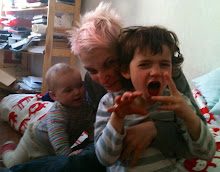certi giorni i bambini possono essere difficili....
Teresa oggi è indemoniata, per fortuna ora dorme un pò.
E' difficilissimo a questa età spiegare ad un bambino perchè non deve fare una cosa o distrarlo da intenti pericolosi...ci vuole pazienza pazienza...io respiro profondamente e appenna posso cucino una torta... come ho appena fatto: TORTA DI CAROTE E PERE :)
mi rileggo poi i princi del A.P...che aiutano sempre
some days chidren could be diffcult...
Teresa today is posseded by the devil forces...for sure..., now she sleeps thank god...
It's so hard to explain to a toddler not to do something or distract him from doing something dangerous or wrong
you must be so patient..sooooooo patient
i breath deeply and as soon as i can i make a cake...like i did already :vegan carrot cake with pears on top:)
and in the crisis moment i read again ...and again ,the AP principles..it helps :)
"Practice Positive Discipline
Attachment Parenting incorporates the "golden rule" of parenting; parents should treat their children the way they would want to be treated. Positive discipline is an overarching philosophy that helps a child develop a conscience guided by his own internal discipline and compassion for others. Positive discipline is rooted in a secure, trusting, connected relationship between parent and child. Discipline that is empathetic, loving and respectful strengthens that the connection between parent and child, while harsh or overly-punitive discipline weakens the connection. Remember that the ultimate goal of discipline is to help children develop self-control and self-discipline.
The Dangers of Traditional Discipline
Instilling fear in children serves no purpose and creates feelings of shame and humiliation. Fear has been shown to lead to an increased risk of future antisocial behavior including crime and substance abuse
Studies show that spanking and other physical discipline techniques can create ongoing behavioral and emotional problems
Harsh, physical discipline teaches children that violence is the only way to solve problems 
Controlling or manipulative discipline compromises the trust between parent and child, and harms the attachment bond
It is a sign of strength and personal growth for a parent to examine his or her own childhood experiences and how they may negatively impact their parenting, and to seek help if they are unable to practice positive discipline
A Gentler Approach to Discipline
Positive discipline begins at birth. The bonds of attachment and trust that are formed when parents consistently and compassionately respond to an infant's needs become the foundation of discipline
Positive Discipline involves using such techniques as prevention, distraction, and substitution to gently guide children away from harm
Help your child explore safely, seeing the world through his eyes and empathizing as he experiences the natural consequences of his actions
Try to understand what need a child's behavior is communicating. Children often communicate their feelings through their behavior
Resolve problems together in a way that leaves everyone's dignity intact
Understand developmentally appropriate behavior, and tailor loving guidance to the needs and temperaments of your child
Children learn by example so it's important to strive to model positive actions and relationships within a family and in interactions with others
When parents react in a way that creates tension, anger or hurt feelings, they can repair any damage to the parent-child relationship by taking time to reconnect and apologize later
Tools for Positive Discipline
Maintain a positive relationship
Use empathy and respect
Research positive discipline
Understand the unmet need
Work out a solution together
Be proactive
Understand the child's developmental abilities
Create a "yes" environment
Discipline through play
Change things up
State facts rather than making demands
Avoid labeling
Make requests in the affirmative
Allow natural consequences
Use care when offering praise
Use time-in rather than time-out
Use time-in as a parent, too
Talk to a child before intervening
Don't force apologies
Comfort the hurt child first
Offer choices
Be sensitive to strong emotions
Consider carefully before imposing the parent's will
Use logical consequences sparingly and with compassion
Use incentives creatively with older children



ehehe leggo questa frase "risk of future antisocial behavior including crime and substance abuse" e penso a me...
RispondiEliminami sa che mia madre allora nn era AP! :°°°D
hi hi mi sa nemmeno la mia.....
RispondiElimina:°°°D
RispondiElimina